Menu
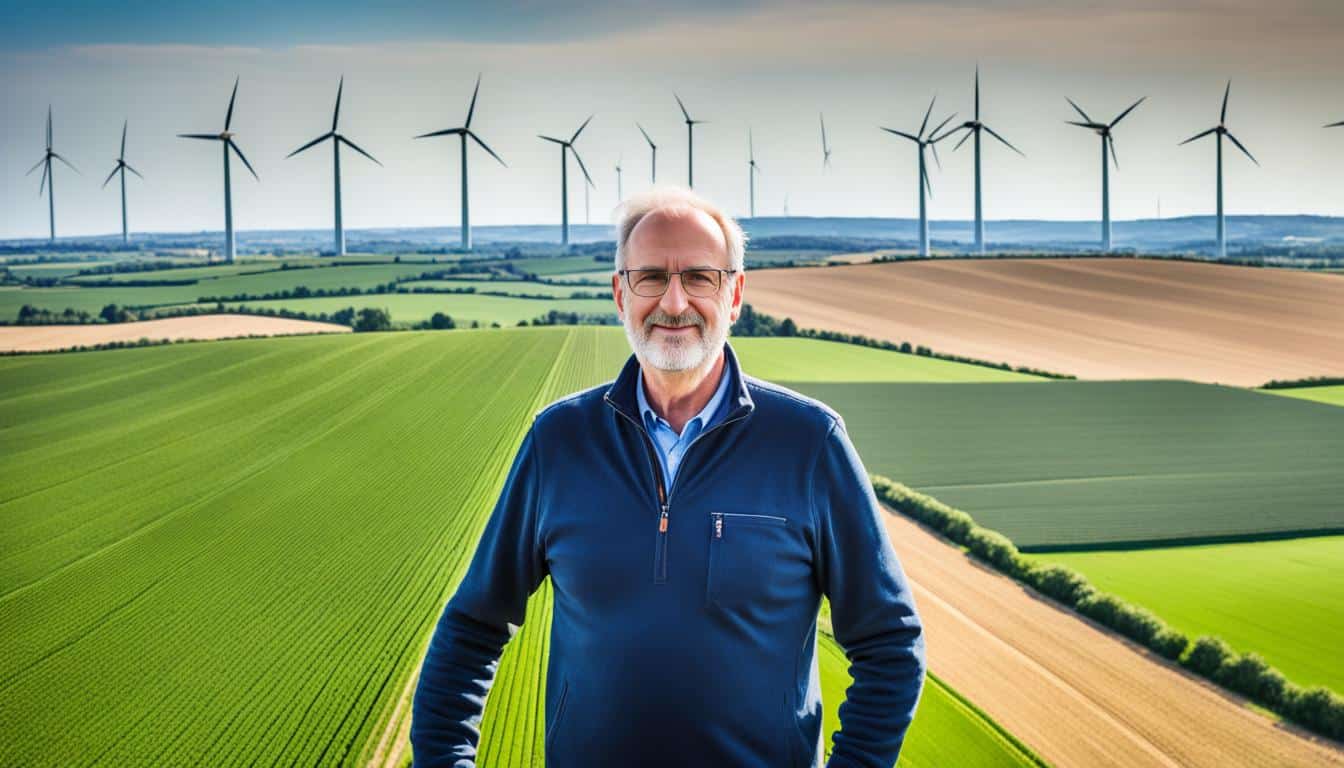
Did you know, last year, just 1% of UK seasonal farmworkers were British? The rest, a huge 99%, came from Eastern Europe. This fact shows one major problem for UK farming after Brexit. It faces big changes like a lack of workers, new green rules, and trade deals in flux.
Farmers are learning to deal with these challenges. They are changing how they work to handle new rules and stay strong. These changes are key for UK farms to fight back and ensure their future success.
The UK farming scene is changing a lot because of Brexit impact on farming. There are many new rules for British farmers to follow. They are working hard to keep food supply strong. This is happening while the market is changing too. Now, there are more agricultural schemes and the payments are better.
This year, there’s been a 10% increase in payments in some farm programs. This means farmers are earning more for what they do.
Farmers can now get money for 50 new things they do on their farms. This includes actions like planting trees and using robots to weed. If farmers help the environment a lot, they get extra money. For example, they may get £765 for every hectare they set aside for bird nests. They could also get £1,242 for turning a part of their land into a river habitat.
In 2023, over 8,000 farmers joined a special programme for eco-friendly farming. And, a similar scheme saw a big jump in the number of farmers signing up. Over £168 million has been promised by the government to help out with ideas in farming. This money will go towards making food, taking care of animals, and protecting the environment. Plus, there’s another £45 million to buy more tech for farming. This will include robots and other automated tools.
Even with these boosts, UK farmers are under a lot of pressure. They are competing against farmers in the EU who get more support. Since Brexit, less food from the UK is going to the EU. And the support money for farmers in the UK is going down. This is made worse by inflation.
Each part of the UK is also making different choices. For example, England and Wales are stopping some kinds of payments to farmers. But, Scotland and Northern Ireland are keeping more of those payments. In England, they are focused on paying for things like protecting the countryside. In Scotland, the plan is to keep focusing on making good food and fighting climate change.
To sum up, UK farming is facing a big change post-Brexit. It’s key for farmers to use new and eco-friendly ways to farm. This will help them meet the new demands and stay strong.
Since Brexit, UK farming has changed a lot due to new rules. The EU’s Common Agricultural Policy (CAP) has ended. Now, British farming rules focus more on taking care of the environment and animals. The UK government says these changes are needed because the CAP took up a lot of the EU’s budget.
New rules put a strong emphasis on protecting the environment. Many of UK’s water sources are in bad shape, so farmers need to do more to stop pollution. They are encouraged to use better farming methods that keep the soil healthy and protect wildlife. This helps to stop trees from being cut down too.
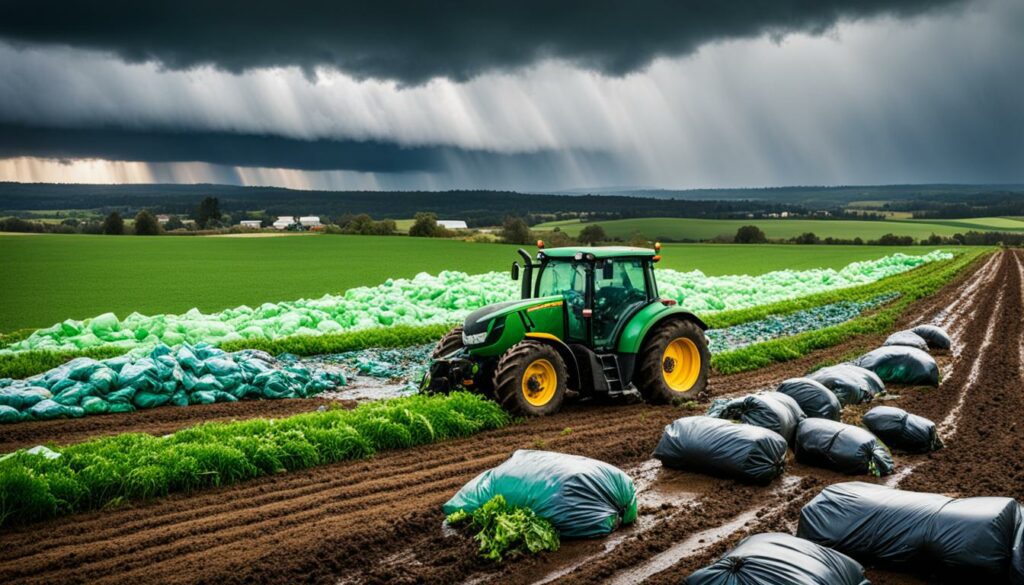
In England, the focus is on paying farmers for helping the environment through ELMS. But Scotland and Wales have slightly different approaches. Scotland keeps giving farmers money directly, but with tougher eco-rules. Meanwhile, in Wales, saving nature is a bigger priority than money for all farmers. This shows how farming policies have changed differently in the UK since leaving the EU.
How animals are treated is under more spotlight after Brexit. The UK wants to make sure animals are well looked after, from the farm to overseas sales. Doing this right helps keep good trade deals and meets the world’s high farming standards.
Northern Ireland is more focused on food without the strict green and animal rules seen elsewhere. This could lead to big farming differences between it and the rest of the UK. The UK needs to find a way to mix farming that’s productive, good for nature, and cares for animals.
The effect of climate change on farming is clear, pushing for quick changes in how we farm. We need to grow crops that can handle droughts and find ways to deal with severe weather. This will help keep UK farming strong.
With more extreme weather on the horizon, it’s crucial to grow crops that can withstand droughts. Researchers have found certain genes in crops like barley that make them tough during dry spells. The UK spends £2.4bn yearly on farming, making it key to focus on developing drought-resistant crops. This not only helps farms last longer but also ensures we have enough food, especially after Brexit.
The Riverford organic farming group warns that some farmers might have to stop working because costs are going up. An initiative called BI4Farmers has started with over 100 farmers pushing for better help. It shows how much we need farming that can adjust and keep going.
Farmers are finding it harder and harder to cope with the more frequent extreme weather. Around half of them worry they might have to shut down at some point. It’s clear they need smart ways to change, from new crops to better ways to use water.
How each UK area responds to farming changes after Brexit varies. In Wales, farmers have to set aside 20% of their land to plant trees and welcome nature. However, Northern Ireland is slow to introduce a new plan, facing extra troubles as a result. Working together could lead to a strong farming plan that’s ready for the climate’s challenges.
Dealing with climate change impact agriculture calls for many actions. The UK should work hard to create farms that can survive and even thrive. Issues with the EU subsidy replacements show just how fast we need to come up with new, strong ideas.
| Region | Adaptation Strategy |
|---|---|
| England | Enhanced drought-resistant crop research |
| Wales | 20% land allocation for nature and tree planting |
| Scotland | Diverse new farming schemes |
| Northern Ireland | Pending new scheme development |
The UK faces a big problem because of the *post-Brexit labour shortage*. Many jobs in farming miss having enough workers. This is a big deal because workers from Eastern Europe were a key part of getting crops ready at the right time.
Before Brexit and COVID-19, fewer people were coming to work in roles like farm work and driving. Then in 2020, because of new rules and the pandemic, even fewer workers showed up. This especially hit jobs like farm workers, butchers, and drivers really hard.
“The British Meat Processors Association (BMPA) reported a labour shortage of over 15% among their members, illustrating the significant recruitment and retention challenges post-Brexit,” according to recent findings. Approximately 35,000 pigs had to be culled because of the shortage of skilled butchers. This made a bad situation worse in the *agricultural labour market*.
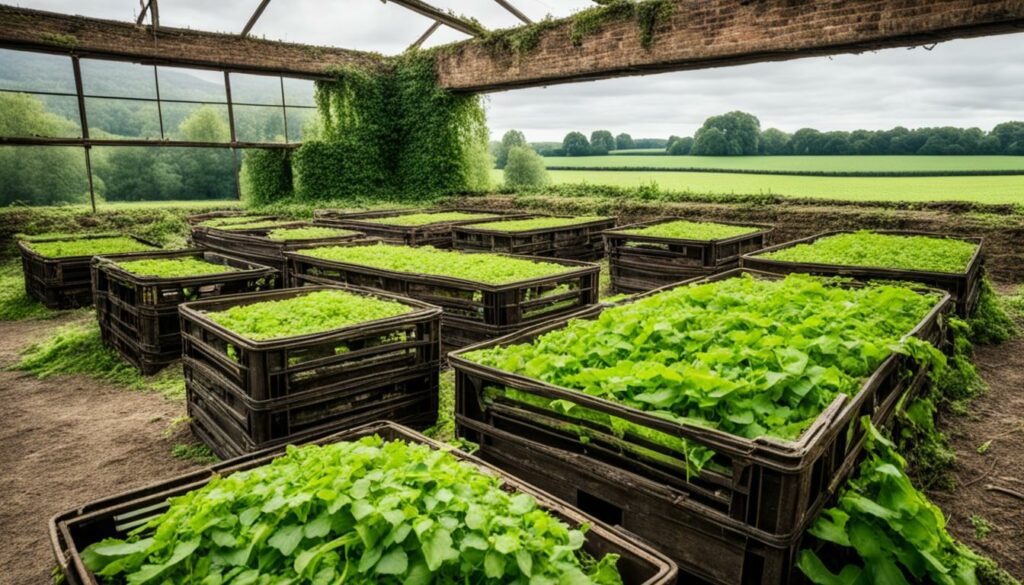
More people over 55 are choosing to retire since 2021’s last part. This is influencing jobs in food production, such as drivers, inspectors, vets, and butchers. Without these experienced workers, the industry struggles.
There are more job openings now that lockdown has eased. From the first to the second quarter of 2022, food businesses have put out more job ads. But, many of these jobs don’t need a lot of skills. This shows there’s high demand for both skilled and unskilled workers in food and drink making.
| Sector | Decline Observed | Details |
|---|---|---|
| Food Supply Chain | Pre-Brexit & COVID-19 | Significant drop in worker numbers |
| Meat Processing | Post-Brexit | 15% shortage, 150,000 animals not slaughtered as planned |
| Agricultural Labour | Post-2021 | Voluntary redundancy and early retirement doubled |
Almost half of the UK’s food comes from other countries. This shows how urgent the need is to fix the *post-Brexit labour shortage*. Without enough workers, farms can’t pick all their crops, like daffodils.
The farming sector in the UK is at risk because of not enough workers. Lawmakers and people in the farming industry want changes to immigration rules. They hope this will bring more seasonal workers who can help out. Using more technology and training people in the UK are also good ideas to solve this problem.
After leaving the EU, the UK is forging new paths in the global farming market. It has signed new trade agreements, opening doors to new markets. This move brings both chances to grow and worries about facing competition from those with lower food quality standards.
Since Brexit, the UK has been working on trade agreements with Australia, New Zealand, Switzerland, and the USA. These new deals are meant to improve market opportunities and bring in new partners. If we look at the Mercosur deal, for example, a study by the Irish Government suggests a substantial increase in meat imports to the EU, which affects UK farmers. The expected rise in dairy production could face a setback with a possible decrease in beef and sheepmeat sectors, all due to these new FTAs.
The UK remains committed to helping its farmers until at least 2024, despite increasing pressures. It is trying hard to cope with the changing market conditions and the new competition.
Exporting UK agricultural goods is getting more complicated. Approvals for UK beef and lamb exports to the US after 20 years could bring in almost $50 million more trade in the next five years. But, challenges from high labour costs and the Scottish Government’s stance against GM crops could make it harder to compete.
The UK imports a lot more in agricultural goods than it exports. So, it needs to sell more internationally to keep its farming sector strong.
Although trade deals mean more competition, they also create new opportunities. For example, the UK is importing more U.S. agricultural products. This shows that trade between the two countries is growing. Plus, the UK is now a top buyer of certain agricultural goods from around the world.
| Country | Import Value (Billion USD) | Export Value (Billion USD) | Key Agricultural Products |
|---|---|---|---|
| USA | 3.01 | Varies | Beer, Wine, Spirits, Nuts, Soybeans |
| China | More than 1.0 | More than 1.0 | Diverse Agricultural Products |
| Brazil | More than 1.0 | More than 1.0 | Agricultural and Related Products |
As the UK works through these complex trade deals, it’s important to remember there are good and bad effects. These new paths after Brexit, competition, and the ability to succeed in exporting agricultural products will shape British farming’s future.
Since Brexit, how the UK supports farmers has changed. Now, there are new efforts to make farms both profitable and green. The Sustainable Farming Incentive (SFI) rewards farmers for helping the environment. It gives money for particular green deeds. But, some worry it might affect how much food we produce.
There’s been a bit of a hiccup with the £2.4 billion set aside yearly for farming by the UK. Many farmers haven’t jumped onto the new subsidy schemes. So, more work is needed to make sure they know how to get and use this money. The SFI, for instance, offers to pay for creating spaces for lapwings or uniting river and floodplain areas.
The UK aims to restore at least 30% of the country’s natural environment by 2030, a target that these subsidy schemes are pivotal in achieving.
For smaller farms, getting to grips with the new support systems is vital. They face extra struggles. A study found that many might not make it because of tricky Brexit deals and other issues. Groups like BI4Farmers want to see a universal payment to help all farmers. This could mean more nature-friendly farming methods for everyone.
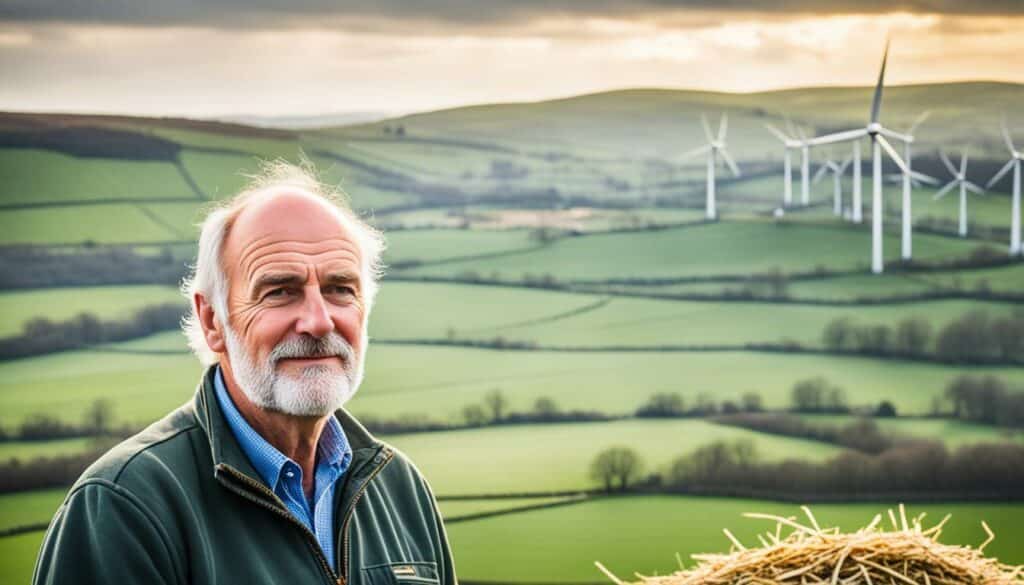
The changes in subsidies could significantly change the UK’s food scene. With a target of 60% food made in the UK, these supports are vital. They not only help increase food quality but also keep the countryside lively.
| Subsidy Type | Reward (GBP per hectare) |
|---|---|
| Nesting plots for lapwing | 765 |
| Connecting river and floodplain habitat | 1,242 |
Although these new supports offer a way forward for green farming, small farms must tread carefully. They need to balance being good for nature with still producing enough food. This is crucial for a strong, sustainable farming future in the UK after Brexit.
In the UK, sustainable agriculture is now a top priority. It aims to protect the environment for the long term. The agricultural sector has reduced its emissions by 12% from 1990 to 2021.
Yet, its contribution to total emissions has increased to over 11% in 2022. This increase shows the need for strong farming sustainability efforts. These would lessen long-term environmental impact and fit the UK’s climate goals.
The push for sustainable agriculture in the UK is growing. The Climate Change Committee wants a big 28% cut in net emissions from farming by 2035. This means reducing about 39 million tonnes of CO2 equivalent.
This goal also includes shrinking agricultural land by one-third by mid-century. Some of this land would be used for planting trees and growing energy crops.
New agro-environmental schemes are encouraging eco-friendly farming. The Environmental Land Management scheme (ELMs) was redone after Brexit. It aims to tackle climate issues like less water, more floods, pests, and wildfires.
The UK is also offering farmers more money to protect the environment. The average value of the Sustainable Farming Incentive (SFI) agreements increased by 10%. This boost has drawn interest from over 8,000 farmers for the 2023 scheme.
But, some people worry that strict environmental rules might lower our food supply. They think we must carefully balance these rules with our need for food. They want to make sure we keep producing enough food without harming the planet.
The impact of agricultural technology innovation on farming is huge. It includes using precision farming techniques, drones, and AI. These changes have made farming in the UK more efficient and sustainable. They help manage resources better too.
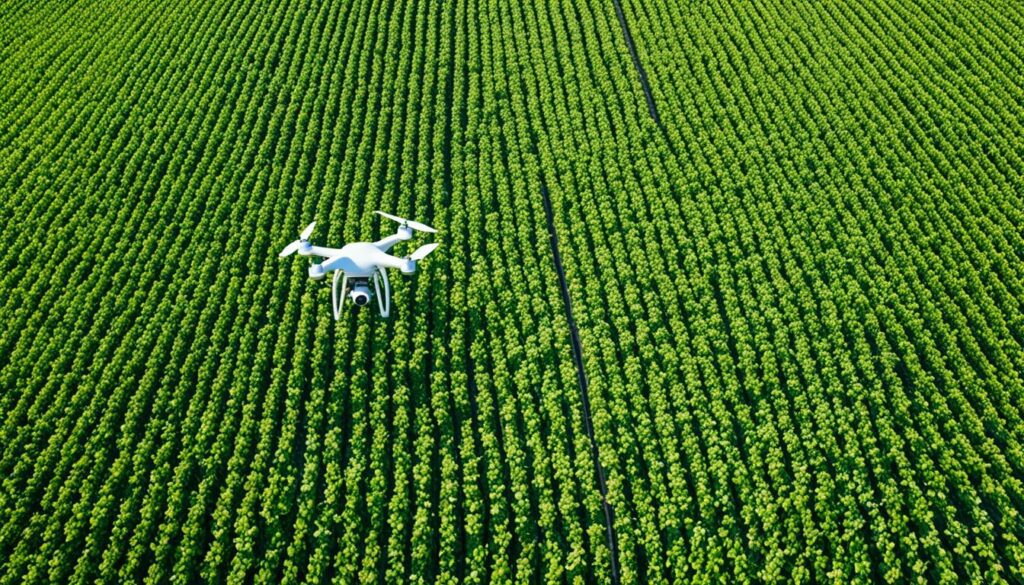
Precision farming lets farmers watch over their resources very closely. They use special tools to get detailed info on soil, weather, and crops. With this information, they can boost their yields and the quality of their produce. Technology like Agrii’s soil moisture monitors, giving detailed soil data, is key.
Now, with the use of such advanced methods, support like the Sustainable Farming Incentive is growing. Countryside Stewardship agreements have seen a 10% rise in take-up. This shows the benefits of modern farming.
Drones and AI are taking farming to new heights. They help with everything from watching crops to managing animals. Drones with AI offer quick land analysis, spotting issues early. For example, Rhiza’s tech is improving decisions on 500,000 hectares in the UK. This boosts farm productivity and sustainability. The UK government’s pledge of more than £168 million in 2023 backs these innovative approaches.
The Agri-Tech Centres, part of the Agri-Tech Strategy, are very important. They’ve started over 500 projects with 350 businesses. This has boosted the use of science in farming. It helps tackle major issues like finding enough labour and fighting climate change. This teamwork keeps the UK leading in agricultural technology innovation towards a strong farming future.
The UK’s post-Brexit agricultural policy scene is full of new rules and big changes. One key point is the lower budget for farm aid, which is also hit by rising prices. England and Wales are stopping the direct payments farmers used to get. But, Scotland and Northern Ireland are keeping some of these payments. This shows how the UK’s farm plans are starting to differ.
In England, a big change is happening with focus moving to the Environmental Land Management Programme (ELM). This programme is all about looking after our land and environment. It’s part of aiming for greener ways and fits the UK’s farm plans after Brexit.
Scotland is putting a lot of effort into making top-quality food that’s kind to the environment. It’s also working hard on bringing nature back and fighting climate change. By doing this, Scotland is making its farm plans more like the EU, which is a key part of its broader strategy.
In Northern Ireland, the main focus is still on making food. There’s not as much stress on the environment or tackling climate change. The rules here look quite EU-like, due to the Protocol. This means laws on things like animal health and pesticides follow EU updates. Northern Ireland might start to do things different from the rest of the UK because of this.
People thought Brexit would bring big new changes in farm policy. But, we haven’t seen them yet. Instead, there’s a bit of a fight between protecting local markets or being open to trade. This makes things harder for farmers to plan their next moves.
| Region | Focus | Policy Approach |
|---|---|---|
| England | Environmental sustainability | Environmental Land Management Programme (ELM) |
| Scotland | High-quality food production, environment, climate change mitigation | Alignment with EU policies |
| Northern Ireland | Food production, less focus on environment | Dynamic alignment with EU regulations |
After Brexit, keeping food security in the UK is harder. About 84% of fresh fruit imports come from the EU. This shows the UK relies heavily on the EU. It means there could be big problems with getting vegetables, salads, and other important foods. This is especially true because of new checks and delays at places like Dover.
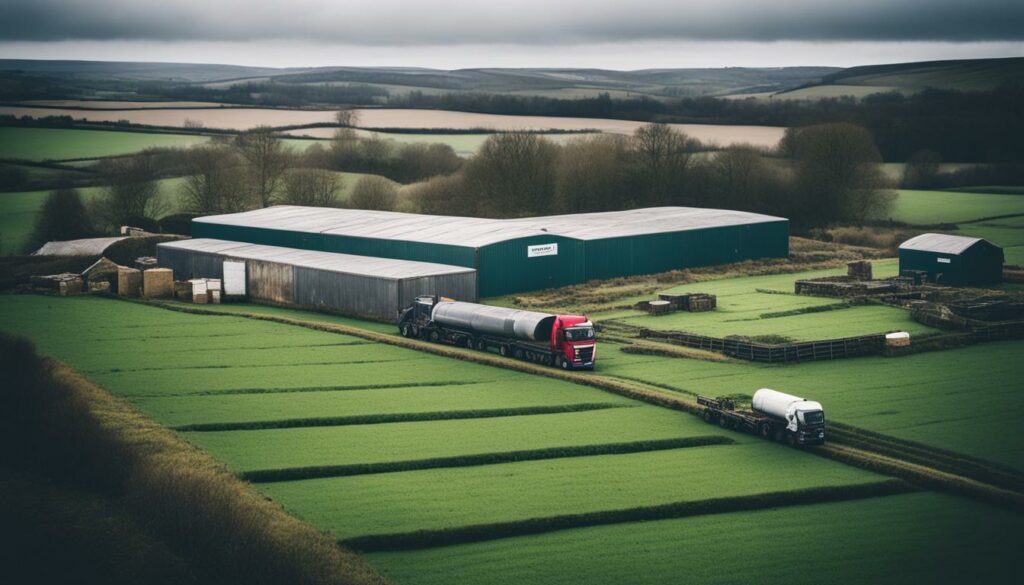
The UK’s food supply chains are complex networks. If one part fails, it can affect the whole system. New methods in managing these chains have made them more likely to face problems. This makes food security in the UK weaker after Brexit.
Problems like climate change make things even harder. There are not enough workers due to travel limits and health concerns. Events like COVID-19 have made this worse. Also, getting supplies like machinery and packaging is hard. All of this makes it tough for the UK to keep its food supply steady.
The Dover Strait is a key way food comes into the UK. If this route has any issues, there could be major food problems. Brexit has made the situation even more serious. Operation Yellowhammer highlights the risks. It talks about how a no-deal Brexit might badly affect food supplies.
Research is looking into how resilient our food supply chains are. Over the years, the UK has become too reliant on only a few suppliers. Most of our fruits and veggies come from parts of Europe like Andalusia and Murcia in Spain. This over-reliance could lead to big problems post-Brexit.
The UK food supply chain is seen as critical to the nation. It’s key to make sure it stays strong. The government needs to help protect key parts of the supply chain. Problems like energy use and finding skilled workers make things even more complicated after Brexit.
| Key Ports | Main Imports | Dependence |
|---|---|---|
| Dover | Fresh Fruits, Vegetables | High |
| Strait of Dover | Variety of Food Products | High |
The UK needs to be ready for any food challenges. It’s important to plan for a steady food supply and control prices. These issues show why the UK food system needs to be strong and flexible after Brexit.
Today, farming in the UK is changing fast. New methods are helping farmers deal with challenges after Brexit. Vertical farming, hydroponics, and aquaponics are leading the way. They are innovative and good for the environment.
Vertical farming is changing agriculture. It uses less space but grows more crops. This means farmers can produce food all year round. It’s great news since UK farmers will soon get fewer subsidies. Vertical farming offers a way to farm even when income is tight.
Hydroponics and aquaponics tackle big farming problems like not enough water and dying soil. Hydroponics grows plants in water full of nutrients, no soil needed. This method lets farmers control how they feed their crops. Aquaponics is even more exciting. It’s a mix of hydroponics and raising fish. This way, the plants clean the water for the fish, and the fish provide nutrients for the plants.
Farming boosts the UK economy by over £120 billion. Using high-tech farming like hydroponics and aquaponics is key to keep growing. These methods also help take care of the planet. They support the government’s plan to farm in ways that are kind to the environment.
For UK farmers, these new techniques are very important now. With the costs going up and not sure about the future of trade, 1 in 4 farmers is worried about money. But with modern ways like these, farming can be more stable and make money. These new ideas are vital for UK farming to keep up and do well in a tough time for agriculture.
Brexit has greatly affected how UK farm products are sold abroad. This has made me look hard at how farming is changing. The UK ranks fifth in the world for buying farm products, but it exports less than it imports. The figures show, in 2022, the UK spent $92.1 billion on imports but only earned $34.8 billion from exports.
The impact of Brexit has made exporting harder for the UK. For example, selling beef and pork has become more challenging. This means the UK must find new ways to reach buyers to sell its farm goods.
The change in export numbers is significant. This is seen in products current trade partners showed sending to the UK in 2022, like forest products and fuel ethanol. Since Brexit, countries such as China and Brazil have sold more to the UK, by over $1 billion. This shows how trading has shifted since Brexit.
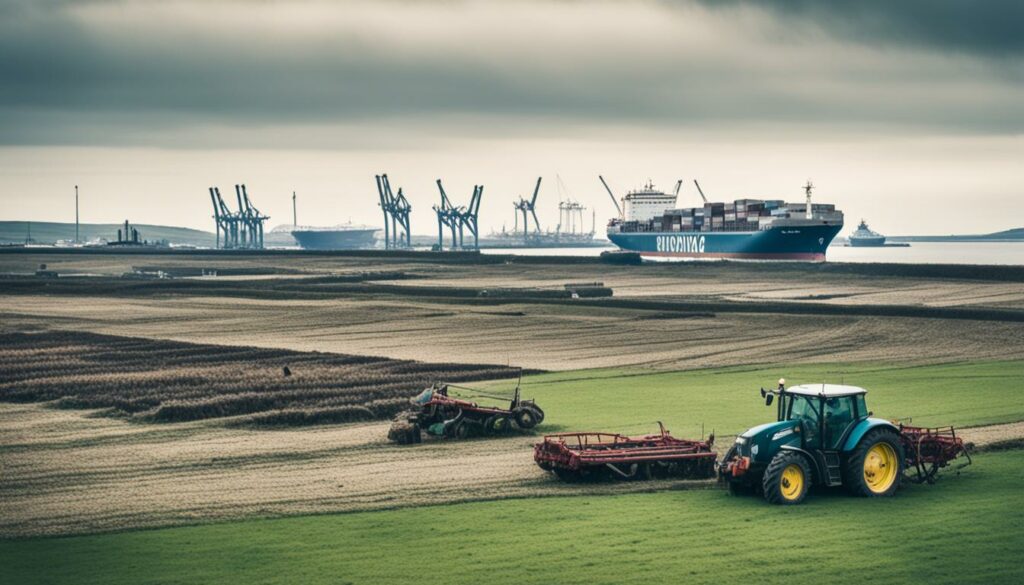
The farming community is feeling the negative effects of Brexit. In fact, 69% of farmers say Brexit has harmed their businesses. They worry about new rules and higher costs. This worry is made even more real by the big increase in what the U.S. sells to the UK. From 1990 to 2022, the value of U.S. exports nearly doubled.
| Country | Export Increase (%) |
|---|---|
| China | 55% |
| United States | 55% |
| Brazil | 55% |
The numbers show something interesting. From 2021 to 2022, what the UK bought from China, the U.S., and Brazil went up by 55%. This proves that things are changing after Brexit. The UK needs to find new ways to get its farm products sold abroad.
I’ve seen that working together and coming up with new ideas are key to push UK farming forward after Brexit. As we face new rules and ways of trading, our farming sector needs to invest in research and work together for lasting, successful farming. This will help us build a strong and steady future.
In 2016, the creation of Agri-Tech Centres was a big step to tackle farming’s big issues. It’s predicted that by 2027, the UK’s agri-tech will add £13bn to our economy. The industry has seen big support, with the government putting in about £320 million and the private sector investing £500 million in 2012-2013. This money has helped more than 350 businesses with over 500 projects, dealing with challenges like finding enough staff, fighting diseases, and keeping up with changes in the climate.
The Agri-Tech Centres show how working together, including businesses, schools, and the government, can spark new farming ideas. This teamwork is vital for facing challenges like bird flu, using technology better, and aiming for zero net emissions. If these groups keep working together, supported by the government, farming can become even more innovative and grow.
To fight against not having enough workers, better deals must be offered. Together with smart partnerships, this can make sure farming carries on and stays strong. The money we hope to make from eco-friendly ways and fresh ideas can protect us from problems after Brexit, such as higher running costs and more rules to follow.
| Challenge | Impact | Solution |
|---|---|---|
| Increased Red Tape | Obstacles in exporting to the EU | Streamlined administrative processes through technology |
| Food Wastage | Approval delays leading to spoilage | Faster approval systems with better R&D |
| Labour Shortages | Reductions in immigrant worker availability | Better incentives and workforce strategies |
| Higher Supply Chain Costs | Increased due to additional controls | Cost-effective R&D solutions |
| Uncertainty about Farm Payments | Loss of CAP (€4 billion annually) | Domestic financial support schemes |
Empowering young farmers is key to UK agriculture’s future. By focusing on farm education and giving new farmers big incentives, we’re creating a strong upcoming generation. This new group will have what it takes to succeed in the farming world after Brexit.
Teaching farm topics in schools is vital for early interest in farming. It shows how important farming is and gives basic and practical knowledge to students. The Government’s £220 million investment in technology and productive schemes shows how crucial it is to teach the next generation advanced farm practices.
We need to support new farmers with big incentives. The government plans to give £220 million for productivity and a grant offer of £427 million. There’s also a scheme offering up to £1000 for eco-friendly farming. This makes a solid support system integrating learning and practical help for future UK farmers.
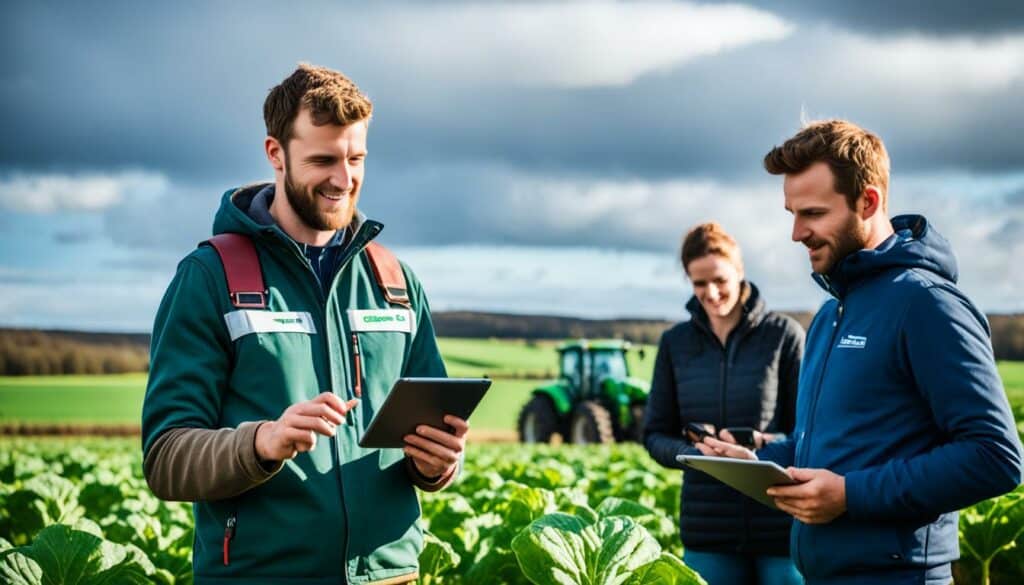
The UK farming scene is facing big changes due to Brexit. Farmers are now working on ways to deal with new challenges. They need to keep up with EU farmers who still get good payments through the Common Agricultural Policy (CAP). Since Brexit, the value of UK agrifood products going to the EU has dropped a lot.
The UK’s funding for farming is also shrinking. This is made worse by inflation. Each part of the UK has its own ideas after Brexit. Some focus on making high-quality food, while others look at being more environmentally friendly and fighting climate change. For example, England and Wales are stopping direct payments to farmers. Yet, Scotland and Northern Ireland are keeping some payments going.
Many in the farming sector feel Brexit has hurt the UK’s economy. About 75% believe this. Also, 69% think it’s harmed their own businesses. Rising costs, more paperwork, and bad trade deals are making things tough for UK farmers. Interestingly, Brexit has also influenced voting choices. About 65% are now less likely to vote for the Conservative party next time.
Inspite of the troubles, the future for UK farming post-Brexit could be bright. To succeed, farmers need to be flexible and embrace new tech. Working together and keeping on top of policy changes is essential. This will help UK agriculture not just to get through, but to rise up and do well, ensuring a prosperous future.
Brexit brought new rules for UK farmers. They must now deal with water pollution, using more sustainable methods. Animal welfare is also under strict inspection since Brexit.
The biggest challenge is tackling water pollution from farm run-offs. To manage this, farmers should mix crops and trees in their fields. This helps soil, wildlife, and stops deforestation. As the climate changes, they also need plants that can survive droughts and extreme weather.
Fruit farming faces big problems without enough workers from Eastern Europe. To solve this, farmers are looking for local workers and want policies that help get seasonal and skilled people from abroad.
Trade deals mean UK farmers can now reach more global markets. But, they worry about cheap, low-quality food coming in. They must follow new rules and deal with different ways of trading.
The new schemes, like the Sustainable Farming Incentive (SFI), focus on being more green. Some worry this might mean less focus on growing food. It’s important for all farmers to get to grips with these new ways of supporting the sector.
Now, UK farms are encouraged to rotate crops, be good for wildlife, and grow trees with their crops. These efforts aim to lessen farming’s harm to the environment and help more plants and animals to live in and around farms.
Modern tech like precision farming, drones, and AI are giving UK farms a boost. They help in using resources better, caring for plants more exactly, and crunching data for better results and sustainability.
After Brexit, the UK is finding new ways to trade, protect the environment, and look after its countryside. This involves figuring out fresh trade rules, making sure there’s enough good food, and hitting green targets with new laws.
Brexit has upped the risk to UK food security and its supply routes. Delays and less food could come from new border checks and rules. This makes creating a strong, independent food network important to dodge such challenges and keep food coming steadily.
UK farming is looking up with new methods like growing food in tall buildings, without soil, and with fish in the water. These techniques mean farmers can produce all year, use spaces better, and save water.
Even UK farmers exporting beef and pork are feeling Brexit’s impact through lower sales. It’s made them rethink how they do things to keep selling to the world.
After Brexit, coming up with new and better agriculture needs everyone in the industry to work together and look ahead. By focusing on new ways to farm and using resources smartly, they can make UK farms stand out worldwide.
To keep farming going strong, there are now steps to get young people learning about it and getting into the business. These efforts are key to sharing knowledge and fresh ideas to ensure farming keeps thriving.